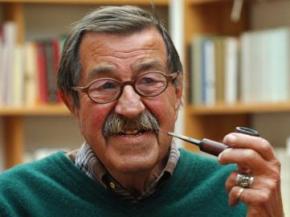A smokescreen to hide the truth
Belfast Telegraph columnist explains what an 84-year-old German writer did to incur the wrath of the Israeli political and media establishment.
THE LAST time I mentioned that some of my best friends are anti-Zionist Jews, I was accused of anti-Semitism. The illogicality and unfairness made me fume.
But Jewish friends assured me that they are regularly derided by the same elements as "self-hating Jews." "And that has to be worse," John Rose insisted. "Don't think you can match us when it comes to suffering insults."
John is the author of The Myths of Zionism, a relentless analysis of the propaganda, deceit and shameless invention which lie at the heart of the ideology of the Israeli state. It is as good a book as any for putting the row over the alleged anti-Semitism of Günter Grass into context. The 84-year-old German writer has been banned from Israel following publication in the daily Süddeutsche Zeitung of his poem "What Must Be Said."
"What Must Be Said" isn't much of a poem. But there isn't a shred of anti-Semitism in it. It deals with Israeli threats to strike at Iran: "It's the alleged right to a first strike / that could destroy an Iranian people / subjugated by a loudmouth / and gathered in organized rallies, / because an atom bomb may be being / developed within his arc of power."

The poem then turns to the region's only actual, as opposed to potential, nuclear power and asks: 'Yet why do I hesitate to name / that other land in which / for years--although kept secret-- / a growing nuclear power has existed / beyond supervision or verification, / subject to no inspection of any kind?"
Grass answers by reference to "my own origins / tarnished by a stain that can never be removed"--a reference both to German responsibility for the Holocaust, and to the fact that, as a teenager, but still shamefully, he'd joined the Waffen SS.
The poem concludes with a hope that "the governments of / both Iran and Israel allow an international authority / free and open inspection of / the nuclear potential and capability of both. / No other course offers help / to Israelis and Palestinians alike, / to all those living side by side in enmity / in this region occupied by illusions, / and ultimately, to all of us."
The awkward plodding even-handedness has not protected Grass from the ferocious anger of the Israeli government and its supporters. The embassy in Berlin characterized the poem as "anti-Semitism in the best European tradition of blood libels before Passover." The phrase "blood libel" refers to one of the fantasies of anti-Semites down through the ages: that Jews murder gentile children and mix their blood with the unleavened bread eaten at Passover.
GIDEON LEVY, a former Israeli army officer and member of the Knesset, now a columnist with Tel Aviv daily Ha'aretz, commented: "It is the branding of [the poem] as anti-Semitic that is a matter of tradition. All criticism of Israel is immediately thus labeled...'What Must Be Said' does contain things that must be said. It can and should be said that Israel's policy is endangering world peace...A situation in which any German who dares criticize Israel is instantly accused of anti-Semitism is intolerable."
Jews, in Israel or anywhere, have a right to feel concerned when a public figure in Germany presumes to lecture them about violence. But it doesn't follow that the content of the lecture must be spurious, much less that the lecturer is driven by hatred of Jews.
The American Jewish academic Norman Finklestein faced fearsome wrath when he referred a couple of years ago to "the Holocaust industry." But his point was sound--that it is the use of the genocide to bolster and justify the racist state which, more than any other single factor, has besmirched the moral authority of the Holocaust.
José de Sousa Saramago is a friend of Grass and a fellow Nobel laureate. After a visit to the occupied West Bank, he referred to settlers "living under the shadow of the Holocaust and expecting forgiveness for everything they do in the name of their suffering...They have learned nothing from the suffering of their parents and grandparents."
Levy concludes, with the two laureates in mind: "They are not anti-Semites, they are expressing the opinion of many people. Instead of accusing them, we should consider what we did that led them to express it."
And consider, too, perhaps, for how much longer it will be morally sustainable to contrive by brute force that the Palestinian people pay with their lives, their freedom and their homeland for a European atrocity that they had nothing to do with. The denunciation of Grass as an anti-Semite is part of a smokescreen designed to hide this question from us.
First published in the Belfast Telegraph.


